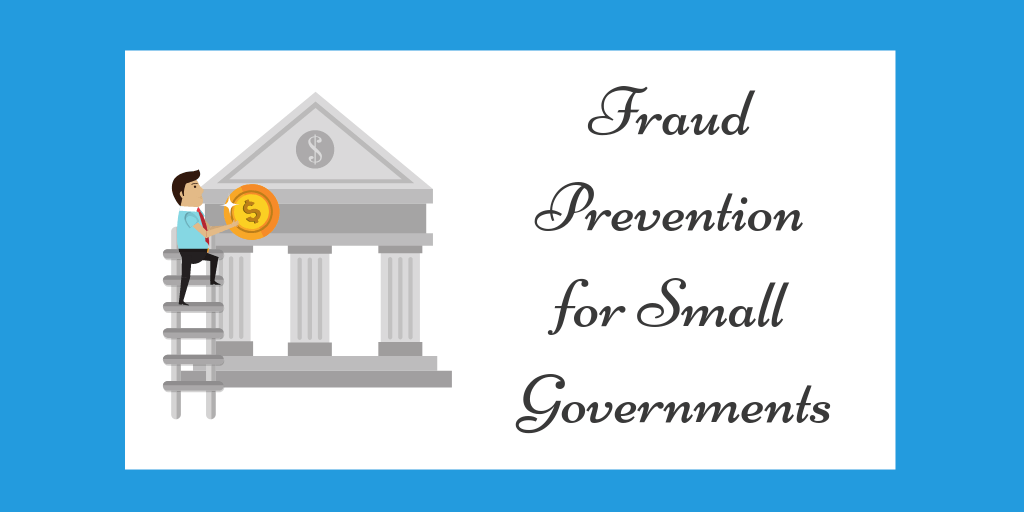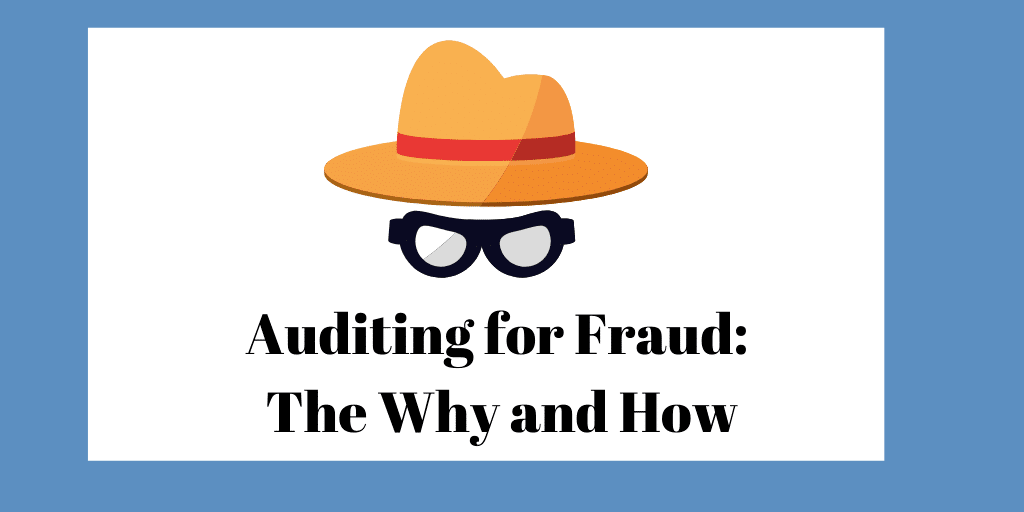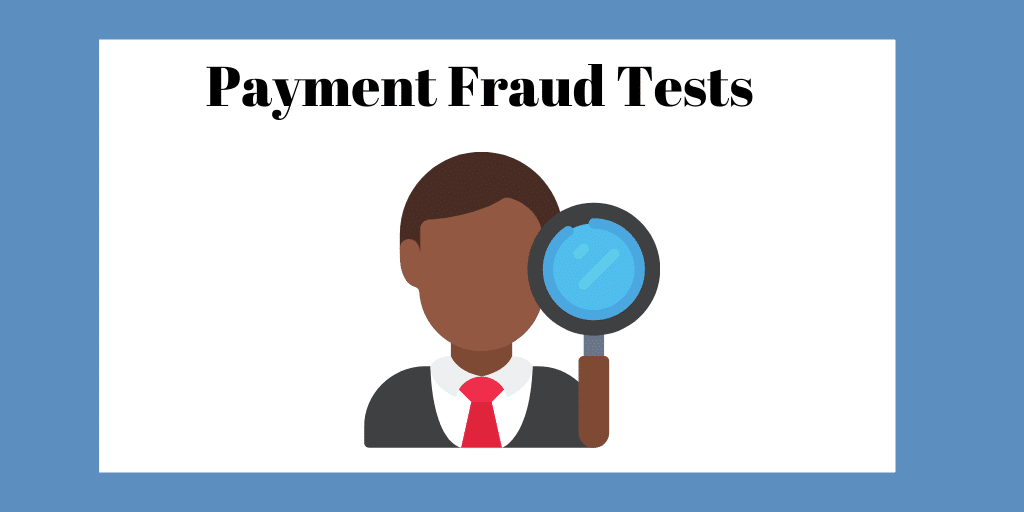Fraud Prevention for Small Governments

Many small governments suffer losses from theft since they lack a sufficient number of employees to segregate accounting duties. There are, however, steps you can take to protect your resources. In this post, I provide ideas for fraud prevention in small governments.
Most government officials don’t realize that external audits are not designed to detect immaterial fraud (immaterial can be tens of thousands of dollars – sometimes even more). Such officials incorrectly believe that a clean opinion means no fraud is occurring in their locale – this is a mistake. External financial statement opinion audits are not designed to look for fraud at immaterial levels. Even if your government has an external audit, consider implementing fraud prevention procedures.
In a typical small government accounting setting, the city of In Between (as in between two stop lights) (population 1,202) has a mayor and three council members. The city has one bookkeeper (we’ll call him Dale) who orders and receives all purchased items; he writes all checks, reconciles bank statements, and keys all transactions into the accounting system. Dale also receipts all collections and makes all deposits. Mayor Chester signs all checks (vendor and payroll). (In a long-standing tradition, the mayor also graces the city Christmas parade float as Santa Claus.) With so little segregation of duties, what can be done?
The smaller the government, the greater the need for fraud prevention – even if Santa Claus in involved. And yet, these are the governments that most often don’t have the resources–whether the money to pay for outside assistance or employees to segregate duties–to prevent fraud. Here are few ideas for even the smallest of governments.
Low-Cost Fraud Prevention
First, let’s look at low-cost fraud prevention options:
- Have all bank statements mailed directly to Mayor Chester who will open and inspect the bank statement activity before providing the bank statements to Dale; alternatively, provide online access to Mayor Chester who reviews bank statement activity and signs a monthly memo documenting his review
- Once or twice a year, have council members pick two months at random (e.g., May and September) and review key bank statement activity (e.g., the operating and payroll accounts)
- Once or twice a year, have council members randomly select checks (e.g., ten vendor checks and ten payroll checks) and review supporting documentation (e.g., invoices and time sheets)
- Once or twice a year, have the mayor and council review receipt collections and related documentation (e.g., for two days deposits); agree receipts to bank deposits and to the general ledger
- Provide monthly budget to actual reports to mayor and council
- Provide monthly overtime summaries to mayor and council
- Do not allow Dale to sign checks
- Require two signatures on checks above a certain level (e.g., $5,000); have two of the council members (in addition to the mayor) on the bank signature cards; supporting documentation (e.g., invoice) should be provided to check signers for review
- Require Mayor Chester and Dale to authorize any wire transfers
- Have Dale provide the mayor with monthly bank reconciliations; the mayor should document (e.g., initial the reconciliation) his review
- Don’t provide Dale with a credit card
- If Dale is provided a credit card, provide him with one card; use a low maximum credit limit (e.g., $1,000); Dale’s credit card statements should be provided to the mayor when he signs the related check for payment
- Use a centralized receipting location (if possible); receipts should always be written upon collection of a payment
Higher Cost Fraud Fraud Prevention
Now let’s examine some higher cost options (that are probably more effective):
- Have an outside CPA or Certified Fraud Examiner (CFE) perform the receipting and payment tests listed above
- Have an outside CPA or CFE map your internal control system and make system-design recommendations
- Have an outside CPA or CFE make surprise unannounced visits (e.g., two per year) to examine the receipting system, payroll, and the payment system; at the beginning of the year, tell Dale that the surprise visits will occur (details of what will be tested should not be communicated to Dale)
- Install a security camera to record all of Dale’s collection and receipting activity
- Purchase fidelity bond to cover elected officials and Dale
Keep in mind that you can limit the cost of the outside CPA. The contract might read Surprise audit of vendor payments with cost limited to $1,500. Try to contract with a CPA or CFE with governmental experience. The surprise audits and the fidelity bond recommendations are, in my opinion, the most critical steps.
Some states like New York audit local governments for fraud; consequently, if your local government is frequently audited by a state agency, there may be less of a need to hire an outside CPA or CFE to perform fraud prevention procedures.
Additional Fraud Prevention Resources
Click here for a list of local government controls to consider.
For additional insights into preventing fraud in your government, get The Little Book of Local Government Fraud Prevention on Amazon.



Yumiko, Most local governments do not hire outside CPAs or CFEs to perform fraud prevention work, though it does happen. I am actually working with a local government next week to review their internal controls.
Charles, I have seen local goverment fraud news on a newspaper and a television frequently in Japan. I just wonder whether local governments hire outside CPA or CFE to perform fraud prevention procedures in U.S. To my best knowledge, it is not a common practice in Japan.
I agree with your thoughts Benson — all good. I especially agree with your sentiment that controls are there to protect the employees. Thanks for commenting.
One thing I believe accountants and internal control professionals need to do much more effectively is to explain the motivation behind these recommendations.
They are NOT because you don”t trust your staff. Trust has nothing to do with it. The recommendations are to PROTECT your trusted employees from unwarranted and false accusations in the event of a theft or other manner of fraud.
Another recommendation is to review the organizations full credit report at least once a year and identify every bank, credit card and loan account listed. This may reveal fraudulently opened accounts.
Finally, criminal background check should be required of every person who has any involvement with financial affairs, including the town council. Have the town attorney review the results if there is any resistance.
Charles, this is a great list for a small city. I would like to suggest two changes:
No. 1.- Replace the council members by an outside accountants as the council members are not trained to identify false documentation, etc. An Agreed-Upon Procedures engagement should be satisfactory and it should not be expensive.
No. 2.- Lower the level on the two signatures on checks may be like to $1,000 but not more than $2,000 to $2,500.
Thanks for the comment Nancy. Hope you are able to remedy your client’s issue. I hope you enjoy the book! (By the way, if you want a hard copy of the book, I should have it available on Amazon in about two weeks.)
I too am currently assisting a client that has gotten an unpleasant surprise from someone they trusted, but didn’t take steps to verify. Thank you for a great article with excellent suggestions. I look forward to reading your book.
First, I like to see these effective recommendations be implemented in the NFPs. I agree that the surprise audits and the fidelity bond recommendations are the most important steps. I agree that the mayor should initial the bank reconciliation; however, I would prefer to have an accounting knowledgeable person to perform a monthly bank reconciliation review in addition to the mayor’s initial. These good suggested steps can and should be implemented at once. The main problem is when the people at the top respond “Oh no, we don’t have that problem, I know Mr./Ms. for x years, I know he/she is honest, responsible, dedicated. We are so lucky we have him/her”
Yes, it’s best to have “an accounting knowledgeable person to perform a monthly bank reconciliation.” Show me an organization that does not appropriately reconcile its bank statements, and I will show you an organization ripe for fraud.
I can relate to the push-back from “people at the top.” We are presently investigating a fraud where the organizational leaders thought the same thing – until now.